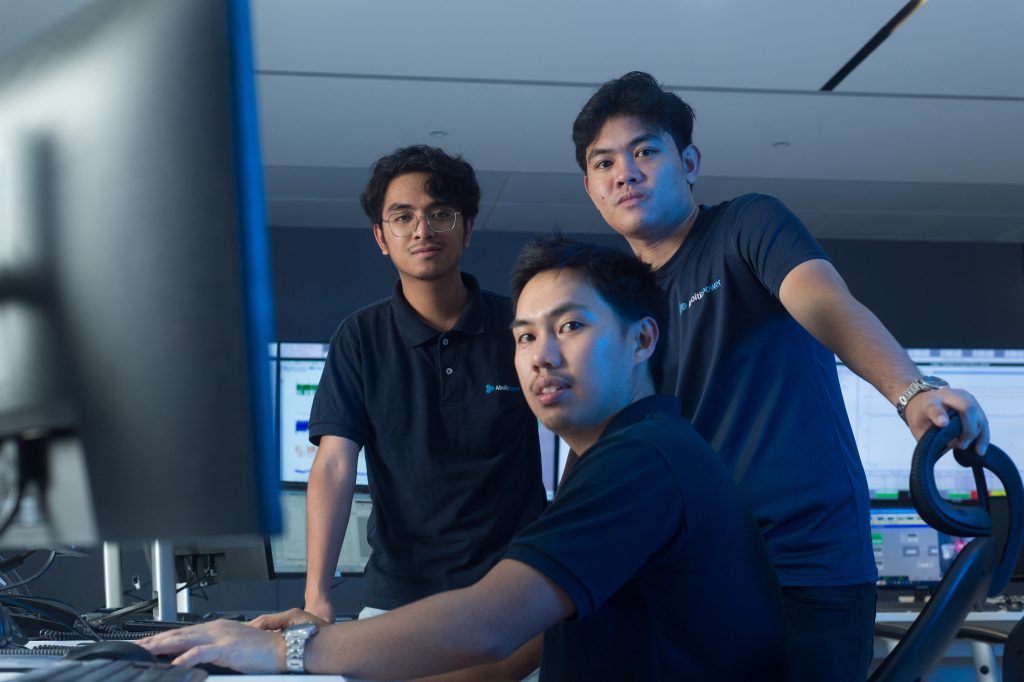(TOP PHOTO) SPECIALIZED DRONES. The operations and maintenance of AboitizPower’s Cayanga-Bugallon Solar Power facility in Pangasinan (pictured) is supported by drone technology, allowing for precision and boosting maintenance efficiency.
Driven by technology and innovation, smart power plants are achieving greater operational reliability and efficiency amidst the transition to cleaner energy systems.
Operational reliability and efficiency in power generation are crucial to the Philippine energy grid, especially as it is expected to absorb both an increase in electricity demand and variable renewable energy capacities in the coming years.
With fewer downtimes and more proactive maintenance activities, smart power plants figure into the bigger picture of centering energy security—or having a sufficient power supply with reliable access—in the grand journey of the energy transition.
Living out its purpose of Transforming Energy for a Better World and partaking in the Aboitiz Group’s Great Transformation, Aboitiz Power Corporation (AboitizPower) intends to pioneer sustainable energy solutions powered by advanced technologies and human ingenuity.
Smart conventional power plants
Under Project Arkanghel, AboitizPower has set a goal to transform its existing coal-fired power plants to become smart power plants through artificial intelligence (AI) and data analytics. Its first phase in the 300-megawatt Therma South Plant in Davao City is already up and running, with expansion set towards the 340-megawatt Therma Visayas Plant in Toledo City, Cebu this year and another conventional plant in Luzon in 2026.
Project Arkanghel establishes a Unified Operations Center, which includes digital twin technologies, anomaly detection and early warning systems, and an “end-to-end” fully integrated live asset health monitoring system. This empowers engineers to predict potential issues and optimize plant operations.
AI-based systems have the potential to help maximize the efficiency of plants, which means lower heat rates, better fuel efficiency, reduced outage days, and longer intervals between planned outages. With its data-driven intelligence, these systems enable engineers to do bolder and more accurate decision-making.

By embracing digital transformation, AboitizPower is optimizing its operations to enable faster, more informed decision-making. This enhances the reliability and availability of its baseload power plants, helping ensure a stable grid amidst growing energy demand.
Strengthening the performance of its baseload facilities helps provide a stable foundation for integrating more renewables into the power system. As the Philippines experiences population and economic growth, dependable and resilient power will be essential in sustaining progress.
In developing Project Arkanghel, AboitizPower has partnered with Thailand-based company REPCO NEX Industrial Solutions. The project also utilizes AVEVA Predictive Analytics, a Schneider Electric solution, to analyze historical data, recognize patterns, and provide early warning detection.
Smart renewable energy facilities
AboitizPower’s investments in technology include its National Operations Control Center (NOCC) managed by its renewable energy arm, Aboitiz Renewables, Inc. This first of its kind in the Philippine power generation sector allows for the operation and monitoring of 28 renewable energy facilities all from one location.
Despite most of the plants being in faraway, mountainous areas, NOCC engineers can observe, make decisions, and control its operations from their computer. Monitoring and data collection are also streamlined, making it easier to consolidate data for strategizing and meeting regulatory requirements.
With operational control and data collection being centralized in the NOCC, operators utilize data analytics, data science, and AI for better resource management, leading to more efficient operations and dispatch of the hydropower and solar facilities integrated in the system. The NOCC also allows for faster communication of detected plant anomalies within its regulated ecosystem, contributing to minimized downtime and losses.

At the same time, in some of AboitizPower’s hydropower and solar power plants, specialized drones are being deployed to make maintenance and rehabilitation activities more efficient. Power plant operators would no longer have to manually visit and inspect each solar panel, conveyance line, or any other component of a renewable energy facility if a drone can do it for them.
Using drones makes inspections quicker, saving AboitizPower a lot of resources since it initially takes significant time and effort for a person to check on the Company’s assets given the sheer size and scope of its facilities.
Outfitted with high-resolution cameras and other onboard sensing equipment, the drones diagnose maintenance requirements faster, resulting in less downtime and more reliability in clean power generation.
The drones have empowered the operators to take preemptive measures, preventing costly breakdowns and ensuring the power plant’s capability to generate electricity. The data collected through drone inspections served as the foundation for a thorough evaluation and design process leading to focused maintenance activities and improvements in the infrastructure.


